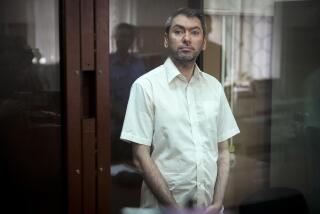MIDDLE EAST : Saudi Arabia’s First Human Rights Group Is Outlawed Within a Month : Dilemma for the U.S. is that more democracy could mean an Islamic regime stricter than Iran’s.
- Share via
CAIRO — Declaring that Islamic law “underlines the necessity of preserving man’s dignity and his legitimate rights,” a group of Saudi Arabian scholars earlier this month formed the conservative kingdom’s first human rights organization.
Within 10 days, the “Committee for the Defense of Legitimate Rights” had attracted 10,000 supporters with its message of fighting for the oppressed and eliminating injustice under the umbrella of the Islamic sharia, or law. International human rights organizations rushed to hail it.
But by last week, it was dead. Its spokesman was jailed, its office telephone disconnected, its leaders dismissed from their jobs, their houses searched and monitored by secret police.
Amid international indignation, the desert kingdom was once again plunged into a debate over opening the House of Saud’s lock on power and widening public participation--at the risk of boosting a muscular new Islamic movement that, if allowed to expand its foothold in the conservative nation that is home to Islam’s two holy cities, could wind up making Iran’s regime look mild by comparison.
The U.S. government, accused of looking the other way on human rights abuses in Saudi Arabia because of the kingdom’s cooperation during the Gulf War, faces a dilemma: whether or not to come to the defense of a budding movement whose calls for democratization could spell trouble for America’s cozy relations with Riyadh.
Saudi human rights activists have long complained that the West ignores the government’s continued failure to deliver on its pledges of democratic reform. King Fahd’s promise to set up by last September an official advisory council, or majlis al shura, for example, has not been kept.
Saudi liberals have long called for greater press and assembly freedoms, an end to the ruling family’s absolute domination of politics and the economy, and freedom for women to drive and to hold equal job and travel rights.
But they are a minority. In recent years, it has been the religious community--in particular, a budding generation of clerics and scholars sometimes at odds with the old religious Establishment--that has been most vocal about reform.
Some of the six founders of the Committee for the Defense of Legitimate Rights, announced May 3, came from such a background. The group included one of the kingdom’s most conservative clerics, Sheik Abdullah ibn Abdurahman Jabrin, who once issued a religious edict declaring Shiite Muslims to be infidels who deserve to be killed. The spokesman for the group, Mohammed Masari, according to one source in Riyadh, was a leading critic of the more than 40 women who tried--during the Gulf War more than two years ago--to defy the ban on women driving.
Yet some of the founding members, such as Abdullah Tuwaijary, professor at the Imam Mohammed ibn Saud Islamic University, are among a generation of moderate young Islamists who endorse such issues as women’s rights while criticizing the kingdom’s crackdown on its religious critics and its failure to consult the public before inviting U.S. troops to stage their 1991 attack against Iraqi occupation of Kuwait from Saudi soil.
Many Saudi liberals have quietly applauded the government’s decision to crack down on the committee, fearing it would lead to Islamic conservatives gaining an even greater toehold.
“I think they try to show their face as democrats. But in fact, they are not,” said one.
But outside Saudi and Arab human rights activists have vigorously defended the group.
“We don’t agree with much of the thinking or the goals that some of those people might have had in the past. But what they represented, to defend human rights in the kingdom regardless of origin, thinking, race or residence . . . this would help the cause of reform,” said Isa Ahmad, spokesman for the Washington-based International Committee for Human Rights in the Gulf and the Arabian Peninsula.
The U.S. dilemma was clear this week, when a State Department spokesman acknowledged that American Embassy employees had met with members of the now-banned organization and had discussed the issue with the Saudi government “in the context of our overall human rights policy.” But the spokesman also noted that some of the committee members “have previously expressed intolerance for the rights of women and sectarian minorities in the kingdom of Saudi Arabia.”
A key issue, both for Saudis and the West, is what will happen if reform is not given a chance.
“If nobody helps put pressure on the Saudi system to open up the system,” said Ahmad, “if those people fail, then the radicals who favor getting rid of the government, those people will get the upper hand.”
More to Read
Sign up for Essential California
The most important California stories and recommendations in your inbox every morning.
You may occasionally receive promotional content from the Los Angeles Times.













